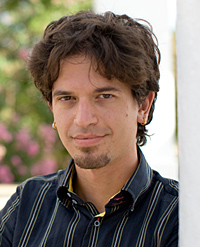How does globalization – including increased participation in global markets – affect how people relate to strangers?
The question is a surprisingly old one. Extending back to at least the 18th century, two contradictory views emerged about globalization's impact on social trust, according to University of Virginia sociologist Simone Polillo, who authored a new study on the topic.
The positive view holds that globalization is integrative and civilizing, increasing people's mutual dependence and leading to greater social trust. The negative view asserts that global competition is destructive and threatening, making people vulnerable to forces beyond their control and thus undermining social trust.
Polillo's new study finds empirical support for both views – suggesting, he said, that globalization is a complex phenomenon deserving a more nuanced examination.
He took several cross-national measures of nations' involvement in international markets and world society, along with measures of the degree of each country's democratic openness and domestic income inequality, and compared them with the results of a survey sample that asked 55,412 individuals in 41 countries, "In general, do you think that most people can be trusted, or can't you be too careful in dealing with people?"
He found that a nation's exposure to international trade decreases general social trust in the countries most exposed to it, while competitiveness in scientific production – a prestigious cultural activity – increases social trust. The study also finds that domestic income inequality undermines social trust, while a country's democratic openness is positively related to social trust. But the country's democratic openness matters less for social trust than the country's participation in science. And scientific production itself can be relatively independent from a country's wealth and level of development.
All of these effects have been hypothesized by various sociologists, but this study is one of the first to empirically test for these effects, explained Polillo, an assistant professor of sociology in U.Va.'s College of Arts & Sciences.
The study, "Globalization: Civilizing or destructive? An empirical test of the international determinants of generalized trust," was published online last week by the International Journal of Comparative Sociology.
The study uses individual and cross-national data from the World Values Survey and other sources on 41 countries for the 2005 to 2008 period.
The World Values Survey is the largest cross-national, statistically representative survey providing data concerning cultural attitudes and social change.
The sample's 41 countries include both countries that display high levels of trust, such as Norway, Sweden and Finland, where 60 percent of the population or more asserts to be trusting of most people; and countries where social trust is remarkably low, such as Turkey, Rwanda and Peru, with 6 percent or less of the population expressing trust toward most people.
The study used several measures of each country's involvement in international markets and world society, including cosmopolitanism (measured by expenditures on tourism abroad as a percentage of gross domestic product), openness to global markets (measured with the ratio of the sum of imports and exports to GDP), participation in world society (measured by the number of international non-governmental organizations active in each country and a country-level count of scientific and technical papers per 100,000 people), and the degree of exposure to international trade competition (measured by "role equivalence in international trade," a complex and well-established metric, in this case based on country-level data on 55 categories of products exchanged in international trade.)
Cosmopolitanism, openness to global markets and the number of international non-governmental organizations active in each country were found to have no statistically significant relationship to a country's level of generalized trust.
The degree to which a country contributes to global scientific knowledge is positively associated with social trust. This is likely, Polillo said, because science embodies a cultural vision of a more rational and ordered society and improved social well-being that supports socially progressive policies like environmental protections, investment in education and protection of human rights.
"One of the main contributions of this paper is to break down globalization into more manageable aspects, and then empirically test how those aspects affect social trust, rather than assuming an overarching one-way relationship between globalization and social trust," Polillo said.
As in any examination of the effects of globalization, one of the great challenges is to separate the effects of globalization from the effects of those domestic institutions and factors that mediate globalization, such as a country's democratic openness and domestic wealth inequality, he said.
Future research should tease out what aspects of scientific research serve as conduits of social trust and what feedback loops exist between social trust and science and a country's democratic openness, the study notes. More research is also needed to further test and determine the specific mechanisms that link competition under globalization to decreased social trust. And more attention needs to be paid to the global and local determinants of inequality, the study notes.
– by Brevy Cannon
Media Contact
Article Information
June 12, 2012
/content/globalization-has-mixed-impact-social-trust-new-uva-study-finds

